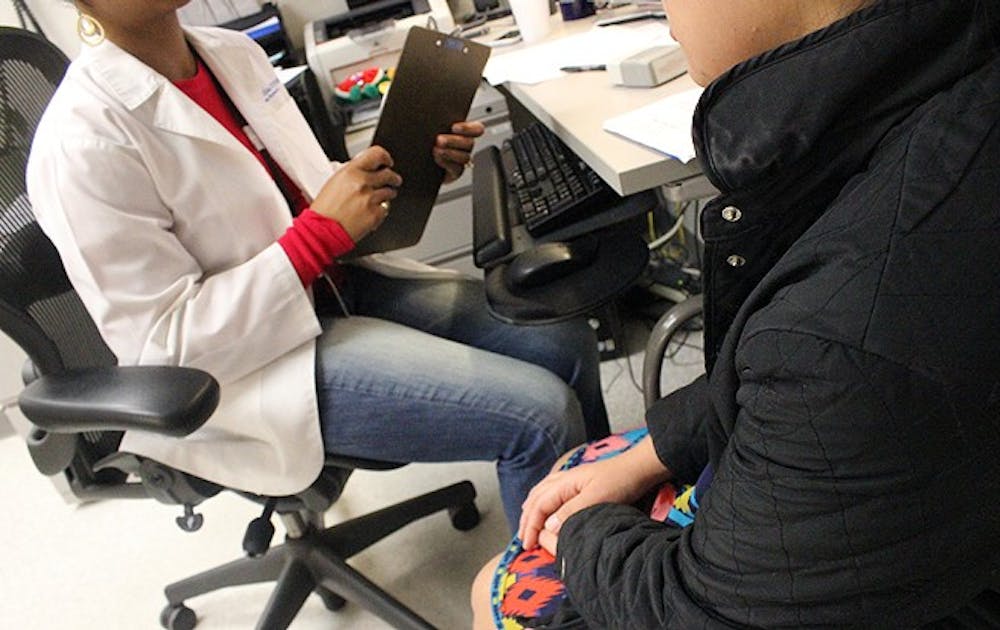North Carolina physicians are contesting what they believe is a medically unfounded abortion law in legal proceedings this month.
A state hearing will determine the legality of an injunction against the Woman’s Right to Know Act clause that requires women receive ultrasounds before getting an abortion. The injunction, enacted by U.S. District Judge Catherine Eagles following the law’s ratification, currently keeps physicians from having to perform the ultrasound for women seeking an abortion. Physicians in the state are being represented in the proceedings by interest groups including Planned Parenthood, the American Civil Liberties Union and the Center for Reproductive Rights.
Although many North Carolina physicians contest the medical necessity of the entire act, this case will only determine the fate of the ultrasound component of the law, which is currently enjoined, said Andrew Beck, an attorney for the ACLU who is arguing for the injunction. The matter is currently undergoing summary judgment briefing, which means the defendants and plaintiffs are arguing their respective sides to Eagles.
If Eagles can come to a final decision as to whether the injunction should be upheld, the case will not go to trial. If it does go to trial, it is expected to begin in January.
The Woman’s Right to Know Act requires that patients seeking an abortion in North Carolina must wait 24 hours before the procedure, receive scripted counseling and get an ultrasound. The law passed both houses of the state General Assembly in June 2011, but Gov. Bev Perdue vetoed the bill later that month. The Senate overturned the veto late July 2011, and the law went into effect that October.
During the ultrasound procedure, patients must be given the opportunity to view the image of a fetus, have the image described to them and be offered the opportunity to hear the fetus’ heart tone.
“There’s no medical basis to [the ultrasound requirement] whatsoever,” said Dr. Serina Floyd, an obstetrician and gynecologist at Duke Medicine and a plaintiff in this case. “It’s entirely ethical, moral and political and not in any way medically based.”
Floyd added that the intent of the ultrasound component of the law is to change patients’ minds so that they keep the child. She noted, however, that it not only does not work but also makes an already difficult process even harder for the patient.
District Attorney Benjamin David, one of the act’s defendants, could not be reached for comment. Sen. Jim Davis, R-Macon, who voted for the act, also could not be reached for comment in time for publication.
William Meyer, an associate clinical professor in the departments of obstetrics and gynecology and psychiatry who provides counseling to patients post-abortion, said the ultrasound component of the law has the potential to incur psychologically damaging effects.
“The idea that we should take something that is already difficult and painful and say, ‘Not only is this difficult and painful, but we are really going to up the ante and make you pay psychologically by rubbing something in your face because we don’t like the decision you’re making,’ I think it’s damaging, paternalistic and imposing,” he said.
‘Vexing and complicated’
The law came in the wake of other abortion restrictions rippling throughout the country last year, Floyd said.
According to a brief released by Guttmacher Institute Dec. 1, 35 states currently require women to receive counseling before an abortion, 27 detail the type of information women must be given, and 26 specify a time period women must wait before an abortion.
Floyd noted that prior to the legislation, North Carolina already had restricted access to abortions. In many states, the gestational age limit—the period in pregnancy after which an abortion is considered “late term”—is 24 weeks, she said. In North Carolina, the limit is 20 weeks.
“All over the country, states are trying hard to further restrict access to abortions, and North Carolina jumped on that bandwagon when it passed the legislation,” she said.
Although the current trial only looks at the ultrasound requirement, physicians at Duke noted issues with other aspects of the act. Meyer said he completely opposes mandated counseling, for example, because it could have psychologically damaging effects.
“What might be right for one person might be damaging for another,” he said. “These are vexing and complicated issues and any attempt to simplify them and say, ‘What is right for one might be necessary for everyone’—well, I don’t think we can go there.”
The mandatory counseling states the medical risks associated with an abortion as well as the risks involved in carrying a pregnancy to term. There is also a portion of the script that discusses potential alternatives to abortion.
“There are alternatives to abortion, including keeping the baby or giving up the baby for adoption,” reads an excerpt from the state-mandated script. “If you decide to continue the pregnancy the father of the baby is liable to assist in the support of the child, even if he has agreed to pay for the abortion.”
Dr. Jessica Morse, an obstetrician and gynecologist at Duke Medicine, said the script does not take into consideration that women receiving abortions may not have had a choice. Women may have had to terminate the pregnancy, for example, because either the fetus will not survive childbirth or they themselves are at risk should they go through with the pregnancy.
“It’s insulting for me to have to tell her that the father of the baby, by state law, would be required to pay child support when she wishes to have that child,” Morse said.
Get The Chronicle straight to your inbox
Signup for our weekly newsletter. Cancel at any time.

